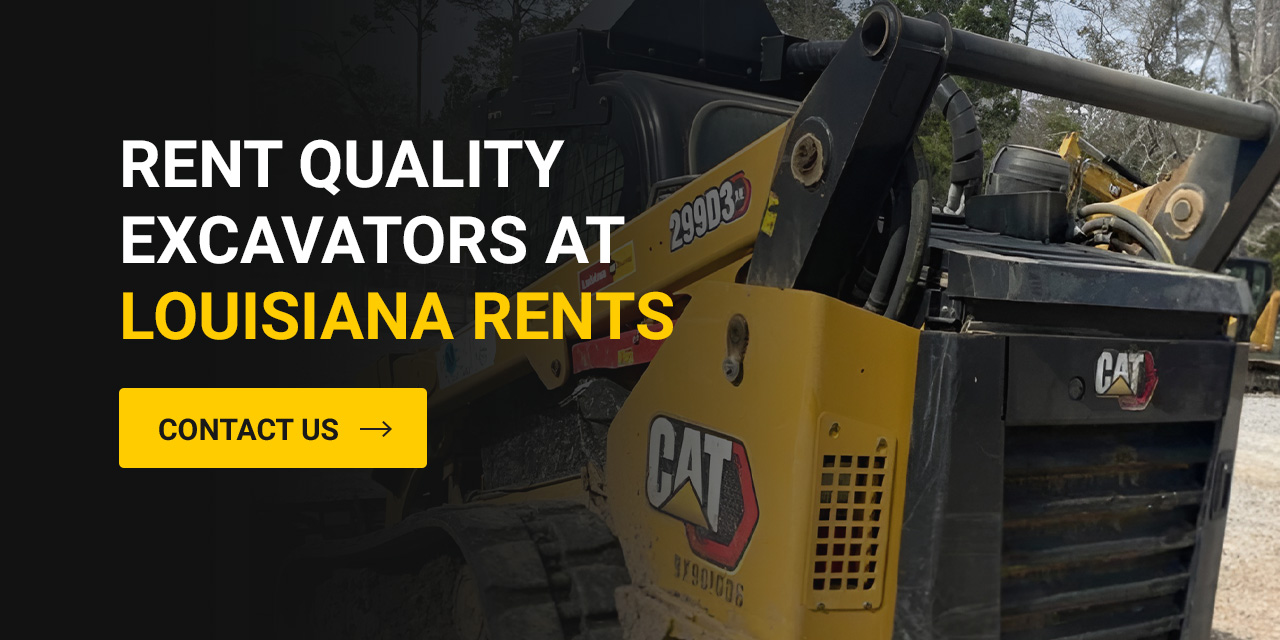Excavators are a valuable part of any fleet. These machines can transform with the click of an attachment to tackle many tasks. A Cat® excavator is a staple of industries spanning construction, forestry, mining, and demolition. For contractors and fleet owners, renting can be a budget-smart purchase alternative. Say yes to more project opportunities with equipment you can rent for as long as needed.
Preparation is key before signing on the dotted line. Louisiana Rents is a trusted rental provider of excavators from Caterpillar and other top manufacturers. In this guide, we share our knowledge of excavator rental. Explore what influences rental rates, understand agreements, and budget for equipment rental.
Jump To Sections:
The cost to rent an excavator depends on application, size, customization, and duration. Here’s how these factors can influence the total rental price:
Different excavators suit specific tasks. Selecting the right type ensures efficiency and productivity on your project. Factors like terrain, space constraints, and environmental conditions can impact the excavator’s performance. Matching the excavator to the job requirements optimizes operational effectiveness and safety.
The excavator you rent must be the correct size to accomplish the tasks you need it to. Consider reach, digging depth, and dump height. Excavator size influences rental costs for a few reasons:
Adding the right attachment turns a standard excavator into a specialized tool. A single excavator can perform many functions, saving you from renting multiple machines. Versatility is one of the excavator’s greatest strengths. Remember, any extra accessories will increase your excavator rental price.
How long you need the machine contributes to the price. Dealers may offer hourly, daily, weekly, or monthly excavator rental rates. Long-term agreements may have lower rates. An accurate timeline estimate ensures you can access the excavator for as long as needed, but even the most well-planned projects can overrun or hit snags. If you need the equipment longer than planned, ask the rental company for an extension.
The rental agreement is a legal contract between you and the provider that outlines each party’s responsibilities, expectations, and fees so everyone knows their part. Understanding the terms ensures you get the most from your equipment rental. Let’s break down your agreement’s key components:
The agreement identifies the lessor — the rental company — and the lessee — you. This section defines each party’s responsibilities. Accurate names and contact information are essential for legal accountability.
This section lists the rental equipment’s make, model, serial number, and accessories.
A rental contract has a start and end date indicating how long the equipment will be in your possession. Unless you extend the agreement, you must return the excavator by the end date.
The rental rate appears here. Depending on the fee structure, you may pay an hourly, daily, weekly, or monthly rate. This section also outlines how and when you will make rental payments. Finally, it should include taxes and extra charges like deposits or late fees.
A rental company sets out rules for the permitted usage and handling of the machine. These terms may include prohibited uses, operational guidelines, or storage instructions.
Your rental provider usually covers maintenance and repair during the agreement term. However, you may be liable for repair costs if you damage the excavator from improper use. Many agreements require authorized technicians to carry out maintenance or repairs.
Insurance coverage is vital to protect you and the lessor from financial liability. Most rental companies provide insurance as part of the agreement. The provider may offer coverage according to your needs, the equipment’s value, or the job type.
Insurance falls into two categories:
Proper planning and budgeting can help you get the most from your equipment rental. Follow these tips to maximize efficiency:
Mapping out the specifics of your project gives you a realistic idea of what type of excavator you need. List the excavator’s tasks, the jobsite conditions, and the project scope. Then, determine the rental duration based on the project timeline.
Dealing with a trusted provider ensures project success. Reputable dealers have an inventory of high-quality, well-maintained machines. Contact the dealer to ensure they have the make and model you need, or consult an expert for recommendations. Louisiana Rents has a range of low-hour excavators from Caterpillar and other top manufacturers.
A detailed budget helps you to plan for excavator rental costs. Include all expenses, such as rental rates, insurance, delivery, or pickup. Add any extra costs like fuel or storage, and build a contingency fund for unexpected expenses.
Coordinate equipment delivery and pickup according to your project timeline. Plan the rental period to get the most use from the equipment, limiting idle time. By monitoring usage, you can maximize efficiency and adjust the rental period.
At Louisiana Rents, we back our extensive rental inventory with exceptional customer service. We offer reliable equipment that fits your operational needs. Rent what you need with flexibility, expert equipment maintenance, and trustworthy service.
Complete our online contact form to learn more, or request a transparent quote today.
